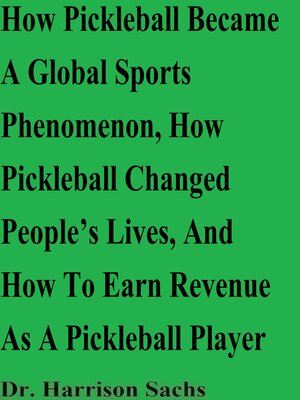How Pickleball Became a Global Sports Phenomenon, How Pickleball Changed People's Lives, and How to Earn Revenue As a Pickleball Player
audiobook (Unabridged)
By Dr. Harrison Sachs

Sign up to save your library
With an OverDrive account, you can save your favorite libraries for at-a-glance information about availability. Find out more about OverDrive accounts.
Find this title in Libby, the library reading app by OverDrive.



Search for a digital library with this title
Title found at these libraries:
| Library Name | Distance |
|---|---|
| Loading... |
This audiobook is narrated by a digital voice.
This essay sheds light on how pickleball became a global sports phenomenon, explicates how pickleball changed people's lives, and expounds upon how to earn revenue as a pickleball player. Pickleball was able to achieve the stupendous feat of becoming a global sports phenomenon amid the 21st century even though this feat transpired decades after its incipience. Even though "pickleball was invented in 1965", it did not become a global sports phenomenon in the 20th century, but rather became a global sports phenomenon amid the 2000s. There are a myriad of disparate reasons as to why pickleball was able to become a global sports phenomenon during the 21st century. One reason as to why pickleball was able to become global sports phenomenon during the 21st century was attributed to there being a significant amplification in the quantity of pickleball courts around the world amid the 21st century. For instance, "USA Pickleball reported a +15.6% growth in the number of pickleball courts nationwide, going from 38,140 courts in 2021 to 44,094 courts in 2022". The inordinate amplification in the quantity of pickleball courts around the world amid the 21st century has rendered pickleball far more accessible to athletes from around the world during the 21st century than it was during the 20th century. It is more seamless for athletes to profusely play pickleball in contexts in which pickleball courts are easily accessible to athletes from around the world than it is for them to do so when pickleball courts are relegated to distant venues. Athletes often prefer to not drive to distant venues to play sports. It is a brobdingnagian inconvenience for an athlete to drive to distant venues to play sports. Furthermore, it can also be expensive for an athlete drive to distant venues to play sports. Moreover, certain athletes have an aversion to driving cars on the roadways.







